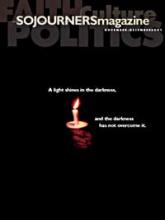Our broken hearts are indeed the proper place to begin theological reflection. Wounded hearts, the tears of suffering and death, however, can lead divergent ways. I think of the Holocaust, a truly innocent suffering on a vastly different scale, but theologically edifying. So many of those who passed through that horror witnessed to a renewed vision of humanity, a moral passion on behalf of all those who suffer violence and injustice. But that same history, the same anguish of suffering, can also be invoked to sanction exclusion, demolition, assassination, air strikes, and Palestinian apartheid. The meaning of suffering and death is partly a moral choice, theologically put.
In the search for the meaning of these events, the temptation is to be justified by suffering. "Justification" is employed here firstly in St. Paul's sense, of constructing a self-righteous idolatry. This is a pastoral issue to which congregations who gather around those in grief ought to be alert. And it is a political issue for a nation that would justify the next round of military build-up, continuing construction of the largest war machine on the planet. In fact, our congregations must recognize that the political maneuver provokes a pastoral crisis of major proportion. When nations intervene, manipulating grief, they offer idolatrous, nationalistic, vengeful substitutions for the grace of God and true community. They preempt the forgiving love of the gospel.
Read the Full Article
